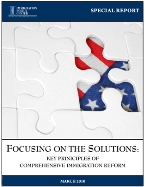We can expect every major piece of comprehensive reform legislation to tackle the issue of creating a legal status for the 11- 12 million undocumented immigrants residing in the United States. Ultimately, most politicians and policy makers agree that practically, the U.S. cannot deport this population, and some kind of process for legalizing status is necessary. However, there remains a temptation to create high penalties in exchange for a green card because many politicians want to ensure that people have paid the price for coming to the country illegally. An overly punitive process, however, ultimately defeats the purpose of a legalization program because it will deter people from participating and potentially drive people further underground. A successful legalization program combines measured penalties with clear and achievable goals that will get the maximum number of people into the system, identify the relatively few who do not belong here based on criminal activity, and integrate those who can contribute their talents as quickly as possible.
Read more...
Published On: Thu, Nov 05, 2009 | Download File






